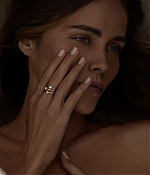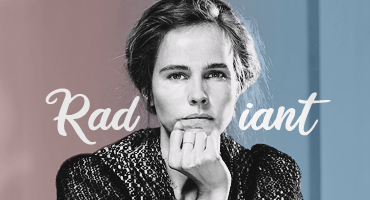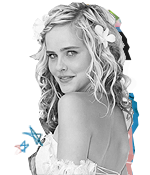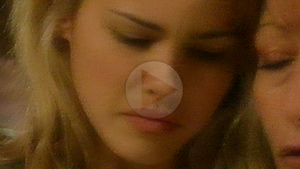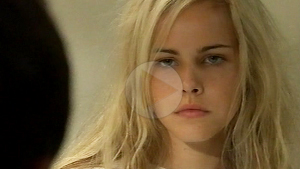Isabel Lucas is a living testament to the folly of judging a book by its cover.
If you believe most of what’s written about the 29 year-old Australian actress, her life is a Hollywood whirlwind of dating A-list studs, chilling with rock stars at Coachella, and vamping on red carpets. If she’s not getting into car accidents with (now former) boyfriend Shia LaBeouf [Insert by Unicorn staff: Shia and Isabel never dated!], she’s looking fabulous in Christian Dior at fashion events. While that may all technically be true, it sums up her essence about as accurately as saying that Diane Keaton is a woman who dated Woody Allen and looks good in hats.
It’s remarkable that Lucas has an acting career at all. Not because she isn’t crazy talented, but because she hasn’t always pursued it with the ferocious ambition of many young starlets. She happened into acting almost by accident, discovered by her future agent not at an audition but at a flea market. For years, she drifted in and out of acting, doing blockbuster films like Immortals, Red Dawn and Transformers: Revenge of the Fallen, and then taking time off to travel the world, spending months in Africa and India. She’s a celebrity activist who actually puts her life in danger for the things she believes. She’s climbed Mt. Kilimanjaro to protest the global water crisis, and swam in bloody water to protest dolphin hunting in the Japanese town of Taiji, where she narrowly avoided being arrested and continues to be wanted as a fugitive.
Lucas has a busy year ahead of her—since breaking up with rocker boyfriend Angus Stone and moving back to LA from Australia, she seems recommitted to acting. Her latest film, The Loft, about five friends and their extramarital affairs, opens in late August. She’ll also be in upcoming films like Careful What You Wish For (which, based on previews, involves her being in a bikini and kissing Nick Jonas) and Knight of Cups, the highly anticipated new movie from celebrated auteur Terrence Malick. After that, who knows? She may skydive with a live stingray off the Trump Tower to protest global warming, or something equally awesome. You never can tell with Lucas.
When I called her for our interview, she was so shy and soft-spoken that I wondered several times if she’d hung up on me. But when she gets going, Lucas has some impressive stories, like what she learned from living with the Aboriginals, doing pre-sex vodka shots with a Jonas Brother, and how life, like a Terrence Malick movie, doesn’t always need a script.
Since The Loft is a remake, I guess we don’t have to worry too much about spoilers.
I suppose not.
You play a woman who gets murdered, right?
Yeah. Her name’s Sarah. The whole thing is based pretty closely on the original, the Belgian version. Have you seen it?
I haven’t, no. Does your character die right away? Or do you get a few lines before you’re offed?
Oh yeah, I’ve got plenty of speaking scenes. The way it happens, her story sort of unravels through flashbacks. We start to piece together what happened to her, and why she was important, through all of these flashbacks.
Did you get a cool death scene?
Well…. I don’t want to give away too much of the plot.
[Laughs.] We don’t want to kill it for everybody.
Oh sure, yeah.
But yeah, there was a death scene. And it was…. quite dramatic. I’m just trying to remember where we did it. We shot half the film in New Orleans and then half in Belgium. It was probably the most intense thing I’ve done as an actress yet.
Was it traumatic?
Traumatic?
Death can be a traumatic thing, even if you’re just playing make-believe.
Sure, but it’s also a really interesting thing to explore. Any part that you play as an actor, you’re creating your own reality. The character’s reality becomes your reality. So exploring this idea of death and what it is and what it means, really delving into this thing that’s very foreign to me, at least at this point in my life, it can be creatively inspiring. That sounds a little morbid, maybe.
A little. But I understand what you mean.
I feel like acting is really a way to learn and grow experientially—like, you’re literally learning experientially through another character. They’re the one experiencing what happens, but it’s still an aspect of yourself somehow.
What’s more difficult, doing a death scene or a sex scene?
Hmm—difficult. I guess it’s all relative. I appreciate challenges, and challenges are by their nature difficult. But challenges are also an opportunity to grow. It’s important to acknowledge the fear that’s involved in any meaningful challenge.
Okay, so then what’s more frightening, doing a death scene or a sex scene?
It’s hard to say.
Oh come on!
[Laughs.] Because it’s relative to the particular situation, or the context of a certain film. Whether it’s about sex or death, you should be confronting those topics as an actor, and that’s never comfortable. So I don’t know how to answer that. What’s more difficult? What’s more fearful, death or sex? It all is, isn’t it?
But are there tricks for making it less fearful, or at least less awkward? Like with a sex scene. You’re on a film set, pretending to be intimate with someone who’s essentially a stranger. How do you make that not weird?
Sometimes you just have to jump straight into it. The more that I can shed my own personal thoughts, fears, ego, so forth, the better. When you’re heading into uncomfortable territory, too much over-thinking can just make it worse. I had a few scenes like that in Careful What You Wish For.
With Nick Jonas?
Right. And the director, Elizabeth (Allen) would do this thing before the love scenes where she’d give Nick and I a tiny little shot of vodka. She’d be like, “Here, you can both take a sip.”
That’s brilliant directing.
It really helped. It wasn’t like we were getting drunk. But it was like, “Let’s take the edge off and really dive into this.”
Doing a love scene is hard enough for an experienced actor, but Jonas is a pop singer with almost no acting experience, who famously took a vow of chastity. Doing a choreographed sex scene for a movie seems like it’d be his idea of hell on earth.
[Laughs.] Well, I don’t know about that.
Was he nervous? Unsure what to do with himself?
I have a lot of respect for Nick. I really felt like he blossomed and grew as an artist. Because he is younger, and being in this movie was sort of bigger shoes for him to fill in some ways. It was really incredible what he brought to this role. He was able to be spontaneous and take so any risks.
To put him at ease, did you ever start humming “Burnin’ Up” or “S.O.S.”?
[Laughs.]Just to put him in his comfort zone a little bit?
He certainly didn’t give the impression of being nervous ever. He was very, very focused. And he did play music all the time. He had his guitar on set, so sometimes when we were waiting for set ups, he’d take it out and just start playing.
Let’s talk about your upbringing. Your family moved around a lot when you were growing up, between Switzerland and Melbourne, Australia.
That’s right.
You also spent some time in Australia’s north coast, where you lived with Aboriginals?
It’s an Aboriginal community called Kakadu National Park. It’s stunning land, and sacred to the Aboriginals in that area. I only lived there for a couple of years, but in hindsight I feel very, very fortunate to have been exposed to that kind of lifestyle. The Aboriginals are still very connected to their culture. There’s a lot of similarities with the Native American Indians, how their history has unraveled.
Did you actually socialize with Aboriginals?
Oh yeah. My best friend was an Aboriginal. I don’t have a lot of contact with her anymore, but at the time, when I was nine, she was everything to me.
Did she teach you anything about her culture? Like how to hunt with a boomerang?
A little, sure. But it was mostly about living in tune with nature and respecting it. She also taught me about “bush tucker,” the food of the land. She told me which fruits and berries and grasses in the bush were actually edible, and which I should avoid. I learned about Dreamtime, which is their faith, the story of creation. I learned a lot of very rich, wonderful things.
You acting career began inauspiciously; you were apparently discovered by an agent at a flea market in Australia.
That’s true. I was just seventeen at the time. I was sitting under this beautiful mango tree, and Sharron Meissner, who was on holiday from Sydney, walked past and saw me. When she approached me, I remember instinctively feeling like I trusted her, that there was a door opening, and it was incredibly organic.
So it wasn’t like the cliché of a show business agent walking up to a teenager and slipping them their card? “Baby, I’m gonna make you a star!”
No, it wasn’t like that at all. It felt like life was asking me to trust the synchronicity from her. And I do trust life. I’ve always been guided by own intuition, and I really sensed that I could trust Sharron. I was always very shy growing up, so acting probably wouldn’t have been something I’d naturally seek out if it wasn’t for meeting her.
You ended up on an Australian soap opera, “Home and Away,” for three years. I don’t know what soap operas are like in Australia, but in the U.S., they tend to be a little melodramatic and over the top.
Sure, that’s true.
Nobody watches a soap opera in the U.S. and thinks, “This is a snapshot of humanity.” Is it like that in Australia?
Well, I really like to refer to it positively, because I think it’s quite well done. It’s been running for 30 years, and it’s a well-oiled little machine. It’s had some wonderful actors. Heath Ledger, Guy Pearce, they all went through this particular show. And the scriptwriting is always incredibly imaginative.
Imaginative as in “I had an illegitimate baby with my best friend’s evil twin and now I have to break the news to my husband?”
[Laughs.] No, no, no!
Was your character ever cloned? Or possessed by a demon?
Nothing like that. My character, Tasha, was often emotional. Probably the worst was…. [long pause] at 18 she fell pregnant. Does that count?
That definitely counts.
It was a Cesarean—like, a Cesarean birth.
Well that’s not too shocking.
And then at some point she joined a cult.
There it is!
Is that what you were looking for?
We have a winner! That’s a soap opera plotline I can get behind. Mom gives birth, joins a cult. That’s perfect!
It was a lot of fun. The whole experience was such a learning experience. Just the incredible amount of dialogue you had to commit to memory each week. I remember on one day, I had seventeen scenes.
On a single day?
Literally one day. Seventeen scenes. It felt never-ending. But that was great. It was like a boot camp for acting.
And it eventually led to you being cast in a Transformers sequel. At the time, did it feel weird that one of your first big acting roles was playing a sexy alien robot assassin in a big Hollywood blockbuster?
Very weird. My family didn’t really believe it. They just laughed and said, “You’re in Transformers? You?” They found that match-up quite funny and a little ridiculous.
You’re someone who talks about synchronicities and is so in touch with nature and has an Aboriginal BFF. To go from that to strangling Shia LaBeouf with your robot tongue, it’s….
Surprising. [Laughs.]
I guess that’s the right word.
But if we could predict life, it wouldn’t be as wonderful and spontaneous, you know? I don’t want to limit myself to a certain kind of movie or genre, because I feel like I can learn a lot from all different kinds of filmmaking. I learned so much from doing Transformers, so many things I wouldn’t have picked up on a smaller film.
Director Michael Bay taught you how to run in high heels, which seems pretty impressive.
He did, yes. And it was pretty simple. He just told me that the trick is to stand on your tippy toes.
That’s it?
That’s it. I actually don’t think I ended up needing to run. He was like, “No, no, just walk.” Which was much easier. But now, if it ever comes up again, on another movie—if they’re ever like, “We need you to run in high heels,” I could do it.
Speaking of eccentric directors, you’re in the new Terrence Malick film, Knight of Cups. When a director with his reputation approaches you, do you even ask to read the script, or do you just automatically say yes?
The latter. I mean, I would’ve loved to read the script. I would’ve been very curious. However, there was no script.
What about after you were cast?
Not even then. There was never any material for me to read.
How does that work?
It was really amazing. His process of storytelling is about finding the truth in each moment. And so you sort of discover who your character is as the experience unfolds. He really encourages his actors to embrace the moments that we label as false or accidents or, you know, moments of awkwardness. Those moments are precious, because they’re honest and they’re true, you know?
I heard he’s been using this technique called “torpedo,” where he just inserts an actor into a scene without telling the other actors. Were you ever torpedoed, or been a torpedo?
I haven’t heard that term, but it certainly sounds accurate. We were certainly diving all over the place. Torpedo is a good way to describe it. It’s also kind of like life.
How so?
You don’t actually know what’s going to happen to you in life. It’s all one big story. Life is one big story, you know?
There’s no script.
Not if you’re doing it right. Why do we need to know? I mean, as long as you feel guided. I felt guided and safe with Terry, so I didn’t have this urge for control. You realize that you don’t analytically need to understand everything. You can sort of trust in the unfolding—the ever-unfolding—because it’s the same as in life. You never really know.
That’s a fantastic philosophy.
It’s very freeing.
One of the most fascinating things about you is your activism. You actually climbed Mount Kilimanjaro.
That’s right.
To the top?
[Laughs.] To the top.
Had you ever done any mountain climbing before, or were you just like, “Well, let’s try this for the first time on freaking Kilimanjaro?”
I didn’t grow up mountain climbing, but my mom is Swiss, and we did spend a year or so in Switzerland, and they have a lot of mountains. I went hiking, which I know isn’t anything like Kilimanjaro. I just felt like I needed to do it. There was an issue and it felt quite daunting.
You made the climb to raise awareness for the global water crisis, right?
Yeah. For clean water. I guess by doing this climb, it was sort of a tangible way of being like, “Okay, through doing this journey, we’re going to start a conversation. We’re going to slowly plant seeds for spreading the awareness and slowly making a change.” Because if there is to be a change, we are it and it starts with small steps. It felt like a really good approach of how to take the next step, I guess.
Intellectually that makes sense, but was there a moment out on the mountain where you were like, “I could die up here. What the fuck was I thinking?”
Yeah.
“This is crazy. What am I doing on Mount Kilimanjaro?”
On day seven—the second to last day of climbing—we were at such a ridiculous altitude and the air was so thin. You were almost gasping for oxygen. I was exhausted, and I’m pretty sure I was hallucinating.
Wow. Seriously?
Yeah. It might’ve been the altitude sickness pills, combined with the lack of oxygen. It wasn’t a comfortable experience. But then you bring it all back to intention. You remember why you’re there, and those concerns just shrink down. You get it all in perspective again.
There’s a great quote I read once about Kilimanjaro. It goes, “Climbing Africa’s Mount Kilimanjaro is like blasting lemon juice in your eye. It’s something you only want to do once.” Do you agree?
I don’t know. Sometimes I think about it, and what a positive experience it was. I really enjoyed being out in nature and being able to connect with the deity of the mountain and see how the landscape changes in just majestic, beautiful ways as you climb higher and higher. But then I think about when it was all over, and how my body felt depleted, and I was like “Yep, that’s enough for me. I will not do that again.” So I don’t know. Anything could happen. [Long pause.] We’ll let life decide for me.
(This story originally appeared, in a slightly different form, in the July 2014 issue of Malibu Magazine.)
 Welcome to Unicorn, your one and only resource for the talented Aussie actress Isabel Lucas, known from "Home & Away", "Transformers: Revenge of the Fallen", "MacGywer" and "Careful What You Wish For". Here you can find detailed information, exclusive high quality photos, all the latest news, as well as other multimedia such as videos, audio files and graphics. I hope you will enjoy the site, and don’t hesitate to get in touch if you have any questions or concerns. Make sure to bookmark us, and check back!
Welcome to Unicorn, your one and only resource for the talented Aussie actress Isabel Lucas, known from "Home & Away", "Transformers: Revenge of the Fallen", "MacGywer" and "Careful What You Wish For". Here you can find detailed information, exclusive high quality photos, all the latest news, as well as other multimedia such as videos, audio files and graphics. I hope you will enjoy the site, and don’t hesitate to get in touch if you have any questions or concerns. Make sure to bookmark us, and check back!



